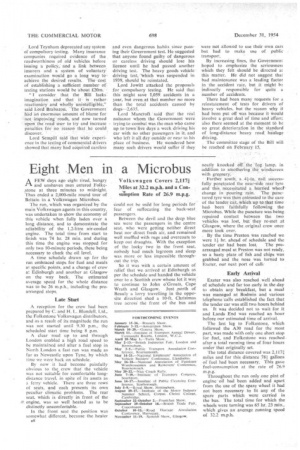Eight ,Men in a Microbus
Page 34

If you've noticed an error in this article please click here to report it so we can fix it.
Volkswagen Covers 2,117i Miles at 32.2 m.p.h. and a Con', sumption Rate of 26.9 m.p.g. AFEW days ago eight tired, hungry and unshaven men . entered Folkestone at three minutes to midnight. Thus ended a 2,000-mile round tour of Britain in a Volkswagen Microbus.
The run, which was organized by the main Volkswagen agents in this country, was undertaken to show the economy of this vehicle when fully laden over a long distance, and to demonstrate the reliability of the 1.2-litre air-cooled engine. The total time from start to finish was 74 hr. 28 min. and during this time the engine was stopped for only two 10-minute periods, these being necessary to check the oil level.
A time schedule drawn up for the run embraced stops for fuel and meals at specific points, and a change of crew at Edinburgh and another at Glasgow on the way back. The estimated average speed for the whole distance was to be 26 m.p.h., including the prearranged stops.
Late Start
A reception for the crew had been prepared by C. and H. L. Blundell, Ltd., the Folkestone Volkswagen distributors, and as a result of its magnitude the run was not started until 9.30 p.m., the scheduled start time being 8 p.m.
A clear road up to and through London enabled a high road speed to be maintained and after a fuel stop in North London a fast run was made as far as Newcastle upon Tyne, by which time we were back on schedule.
By now it had become painfully obvious to the crew that the vehicle was not suitabre for comfortable longdistance travel, in spite of its assets as a ferry vehicle. There are three rows of seats, and each presents its own peculiar climatic problems. The rear seat, which is directly in front of the a, engine, was so well heated as to be distinctly uncomfortable.
In the front seat the position was somewhat different, because theheater as could not he used for long periods for fear of suffocating the back-seat passengers.
Between the devil and the deep blue sea were the passengers in the centre seat, who were getting neither direct heat nor direct fresh air, and remained well muffled with rugs and overcoats to keep out draughts. With the exception of the lucky two in the front seat, nobody had much legroom and sleep was more or less impossible throughout the trip.
So it was with a certain araount of relief that we arrived at Edinburgh as per the schedule and handed the vehicle over to a Scottish crew whose lot it was to continue to John o'Groats, Cape Wrath and Glasgow. Just north of Beauly a lorry travelling in the opposite direction shed a 10-ft. Christmas tree across the front of the bus and
neatly knocked off the -fog larnp. in addition to smothering the, windscreen with greenery.
Farther south, a 41--in. nail successfully penetrated the near-side rear tyre and this necessitated a hurried wheel-change in pouring rain. The punctured tyre was then entrusted to the care of the tender car, which up to that time had been faithfully following the Microbus. While the puncture was being repaired contact between the two vehicles was lost, but they re-met at Glasgow, where the original crew once more took over.
By the time Preston Was reached we were 1.1 hr. ahead of schedule and the
tender car had been lost. The prearranged meal at Preston was not ready, so a hasty plate of fish and chips was grabbed and the nose was turned to Exeter, our next port of calk Early Arrival
Exeter was also reached well ahead of schedule and far too early in the day to obtain any breakfast, but a meal was managed at Bodmin and various telephone calls established the fact that the tender car was still two hours behind us. It was decided not to wait for it and Lands End was reached an hour before our estimated time of arrival.
The last leg to Folkestone, which followed the A30 road for the most part, was made with only one short stop for fuel, and Folkestone was reached after a total running time of four hours under that originally set.
The total distance covered was 2,117,'I miles and for this distance 781 gallons of fuel had been necessary. This gave fuel-consumption at the rate of 26.9
Throughout the run only one pint of engine -oil had been added and apart from the use of the spare wheel it had not been necessary to fit any of the spare parts which were carried in the bus. The total time for which the wheels were turning was 65 hr. 23 min., which gives an average running speed of 32.2 m.p.h.












































































